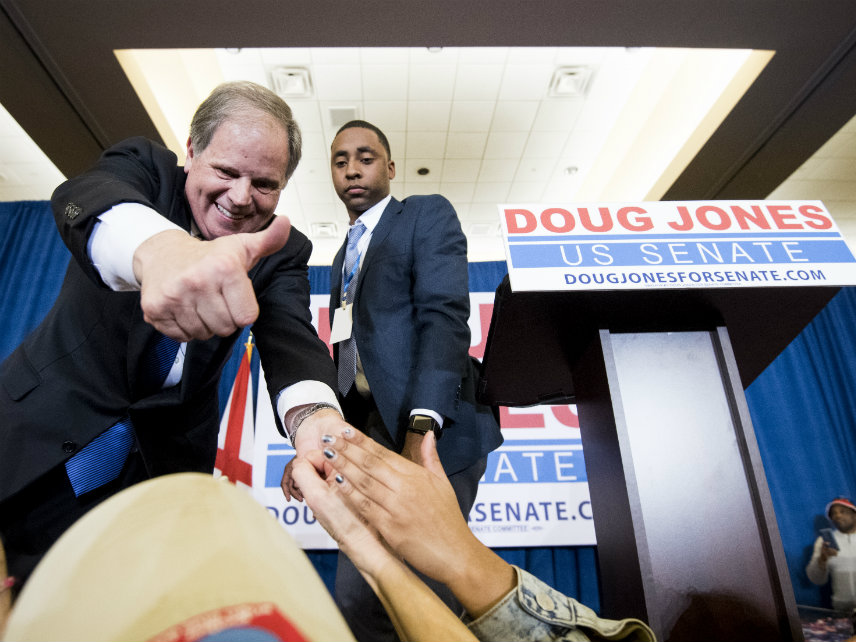Doug Jones, Roy Moore, and the Politics of the Lesser Evil
No one earns a mandate by merely being less awful than the other guy.

Doug Jones' victory in Alabama's special election yesterday was another win for the lesser evil.
That's not to suggest that Jones is evil. Far from it. He seems a perfectly adequate politician who ran an excellent race that few of his peers would have considered winnable when he started campaigning. He seemed genuinely grateful—to his staff and to the voters—in his victory speech. But even after following the much-watched campaign and hearing Jones' speech, you'd have a hard time nailing down exactly what it is that he believes, or how he thinks the country should be run. He won not because he convinced the voters of deep red Alabama to suddenly transform into liberal Democrats (or even conservative Democrats), but because of who he was running against.
Alabamans had not come close to rejecting a Republican senatorial candidate in a quarter-century. The nearest thing to a close call was a 19-point victory in for Jeff Sessions in 2002. Their rejection of Roy Moore, then, is a stunning result, but it's one that points mostly to just how terrible the GOP candidate was. Leave aside the allegations of child molestation if you want, and there was still a long, long list of reasons why he should never have been allowed access to one of the most powerful governing bodies in the world.
The politics of the lesser evil are very much in vogue right now—though not usually in terms as stark as what we just witnessed in Alabama—because neither major party has much in the way of a compelling vision to win support. Demonizing the other side and hardening tribal lines over issues of race, class, and social policy is, if not the only way to win in that environment, then certainly the easiest. This "negative partisanship" has infected all parts of the political dynamic, and it's getting worse.
But winning elections isn't supposed to be the goal of politics. Creating policy is. And the politics of the lesser evil are not good for the creation of policy, because whoever wins gains power and therefore quickly becomes the greater evil.
Voters last year rejected Hillary Clinton—just as they previously rejected Jeb Bush and the rest of the Republican clown car—and Donald Trump happened to be the guy who struck just enough voters as being slightly less awful. The "Trump phenomenon" that the media and political class have spent the last 12 months trying to decode and repurpose for other elections was never the dominant force in the GOP. Indeed, Trump still struggles to elucidate any clear governing philosophy. Many of the votes for Trump, like many of the votes for Jones, were cast not out of any particular love for the man or his political avatar, but as a rejection of his opponent.
There's nothing innately wrong with voting against a candidate instead of voting for a different candidate. The mistake comes higher up. Both major political parties see results that aren't really there. The Republicans headed into 2017 believing they had a mandate from the American people because they had been given control of all three parts of the legislative process, but that was hardly true. Trump, after all, got a scant 62 million votes last year, and far more voters picked other candidates.
Now that Republicans hold all the power in Washington, D.C. (and in most states too, for that matter), Democrats have set about demonizing their policy ideas as outright evil. The GOP is in charge and suddenly the lesser evil is the greater one. The wheel turns and crushes those who rode it to the top.
Democrats may make the same mistake in the wake of the Jones victory—liberal pundits are already excitedly talking about what Tuesday's election means for the 2018 midterms—but their reactions will likely be tempered by the fact that they are still a minority party in the federal government and they are facing an uphill battle in next year's Senate races even with Trump driving voters into their arms. Still, if they are successful in retaking Congress in next year's midterms, I have little doubt that it will be because voters suddenly see them as the lesser evil. Republicans can lend a hand by continuing to nominate noxious candidates like Moore.
Building a mandate requires a vision for how the country should be, and getting voters to back that vision. Republicans don't have a mandate now, and haven't had one all year. Nor did Democrats win in Alabama because scores of conservatives suddenly changed their minds about which direction the country should go. Neither major party has the makings of a mandate, and neither will unless it moves past the politics of the lesser evil.


Show Comments (99)